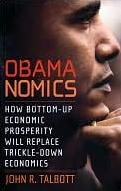 |
|
 |
|
 |
 |
 |
 |
 |
 |
 |
 |
 |
 |
| 2016 Election: | Hillary's book | Trump's book | Bernie's book | Ted Cruz's book | | | 2016 Senate Debates |
Obamanomics How Bottom-Up Economic Prosperity Will Replace Trickle-Down Economics, by John R. Talbott  (Click for Amazon book review)
BOOK REVIEW by OnTheIssues.org: This book leaves a bad taste in my mouth. The reader must be careful when reading, because the author's views are mixed in with Obama's views, with too little distinction between the two. This book is supposedly a pro-Obama economist's analysis of Obama's policy stances -- that's a fine goal. But it turns out to be more like the author's manifesto of his own policy stances, framed around Obama's campaign. For example, the author writes that Obama "has suggested holding frequent town hall meetings with government representatives on the Internet, and he would be well advised to encourage much of his administration's business, as well as congressional deliberations, to be televised on C-SPAN to prevent secret dealings that harm the people." (p. 48) The FIRST part of that sentence is Obama's policy; the SECOND half of that sentence is not! If the author, John Talbott, were a leading economic advisor to Obama, it would make sense to merge his own views with Obama's as an explanation of their sources. But he's not on Obama's team -- so one wonders why Talbott chose to write this book. It seems that he's an economic-advisor-wannabe -- that he's using this book to infiltrate his views into the Obama campaign because he could not figure out how to get onto the campaign staff. For example, Talbott writes about predatory lending, "What else can Obama do to prevent crises like these from occurring again? I have some opinions that I would like to share with you, in the hopes that Obama's financial advisors may end up hearing them and then convince Obama to adopt them. To my knowledge, Obama has never mentioned these or similar proposals." (p. 90) Well, ok, why doesn't Talbott go tell OBAMA rather than telling US so that Obama might hear it? Do we really need to care about Talbott's opinions that he cannot get Obama's own economists to get Obama to mention? Worse, Talbott proposes policy stances that are not economic. Talbott DOES have economic expertise -- but when he "advises" Obama on non-economic issues, he's just another citizen, and we wonder why we should care about his opinion. For example, Talbott writes in his corporate lobbying chapter, "What better way to involve all our citizens than to ask them to vote once a month using their cell phones or the Internet on important issues? While Obama has not suggested such a nationwide poll, he would be well advised to consider it." (p. 109-110) He should? Such a poll would provide a cross-section of opinion that is skewed towards the upper-class who have cell phones and Internet access -- and would play into criticisms of Obama as an elitist. That's just MY opinion, as a political analyst -- but my opinion is just as valid as Talbott's on non-economic issues. Why should Obama listen to Talbott on political issues, and why should the reader? If we had not gotten so caught up in the problem of merged opinion, we would have commented effusively on the economic analysis in this book, and on the clever title. "Obamanomics" is a catchy phrase that is not much used -- others HAVE used it, but Talbott will get credit for it, because of this book title, if it gets adopted into general usage. What Talbott means by "Obamanomics" is a focus on bottom-up economics (focusing on people's interest over corporate interests, in philosophical conjunction with Obama's more well-known internet-based bottom-up politics). "Reaganomics" came to mean the opposite "trickle-down economics", and "Clintonomics" came to mean triangulation between GOP and Democratic views to determine what could pass Congress. No one has defined "Bushonomics" or "McCainonomics" but we look forward to those terms too. Our excerpts attempt to correct the major shortcoming of this book, by carefully reading and separating out Talbott's opinions from Obama's opinions. We cite "Op-Ed" where we consider Talbott's opinions to be relevant enough to excerpt (like on page 39). This book WOULD be a fine economic analysis -- if Talbott could more clearly separate opinion from analysis. But because he does not, it's a tricky book to read, and not recommended beyond our excerpts. -- Jesse Gordon, jesse@OnTheIssues.org, July 2008 NOTE: We review ANOTHER book with this same title here: Obamanomics, by Timothy P. Carney
How Bottom-Up Economic Prosperity Will Replace Trickle-Down Economics, by John R. Talbott.
| ||||||||||||||||||||||||||||||||||||||||||||||||||||||
| ||||||||||||||||||||||||||||||||||||||||||||||||||||||
Page last edited: Feb 19, 2019